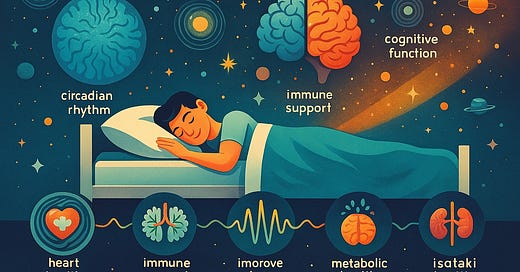Everyone knows sleep is essential, but far fewer realize how critical a consistent bedtime is. Irregular sleep patterns disrupt your body’s internal clock, or circadian rhythm, which regulates everything from hormones to digestion. When you constantly shift your sleep schedule—whether from late-night socializing, binge-watching Netflix, or weekend sleep-ins—you’re effectively giving yourself social jet lag. This misalignment silently sabotages your health—even if you think you’re “catching up” with more hours.
And it doesn’t just mess with your energy. Inconsistent sleep timing has been linked to weight gain, inflammation, reduced cognition, and mood issues. In fact, it’s one of the hidden habits I covered in 7 Habits That Harm Your Brain.
🔬 What the Science Says
Sleep regularity reduces mortality risks: A study analyzing 60,977 participants and over 10 million hours of accelerometer data found that consistent sleep patterns were associated with a 20%–48% lower risk of all-cause mortality, a 16%–39% lower risk of cancer-related deaths, and a 22%–57% lower risk of cardiometabolic mortality compared to irregular sleepers.¹
Stronger predictor than sleep duration: Sleep regularity was found to be a stronger predictor of mortality risk than the total number of hours slept. This held true even after adjusting for age, shift work, and health history.²
Circadian disruption takes a toll: Irregular sleep patterns may cause circadian misalignment, which increases inflammation, disrupts glucose metabolism, and raises the risk of obesity and diabetes.³
Social jet lag compounds the problem: The greater the gap between weekday and weekend sleep schedules, the worse the metabolic health outcomes—and the higher the risk of depression.⁴
Long-term cognitive decline: Adults with irregular sleep schedules performed worse on cognitive tests and reported lower life satisfaction—even when sleep duration was sufficient.⁵
🎯 Practical Takeaways
Set a bedtime alarm. A cue to wind down can anchor your routine. I use one nightly—if I’m not tired, I read until I doze off.
Control distractions. Put your Wi-Fi router on a timer to cut off blue-light temptations 30 minutes before bed.
Track your patterns. Record bedtime/wake time and energy levels, whether with a wearable or pen-and-paper. Patterns emerge quickly.
Ditch the weekend sleep-ins. Try to keep your wake-up time within one hour of your weekday schedule to reduce circadian stress.
Create a pre-bed routine. Gentle stretching, reading, or a short meditation helps your brain shift into rest mode.
Live well,
Brian
References
Huang, T., et al. Association of sleep regularity with mortality risk and cardiometabolic health: A prospective cohort study. Sleep Health, 2022.
Blume, C., et al. Effects of sleep regularity on mortality and longevity. Chronobiology International, 2021.
Roenneberg, T., et al. The circadian clock and social jetlag: Implications for health. Frontiers in Neuroscience, 2019.
Wong, P. M., et al. Social jetlag, obesity, and metabolic health: A population study. International Journal of Obesity, 2015.
Watson, N. F., et al. Irregular sleep schedules and cognitive performance in adults. Scientific Reports, 2018.



Great reminders and counterintuitive info on consistency > duration in some circumstances. Really concise and actionable!